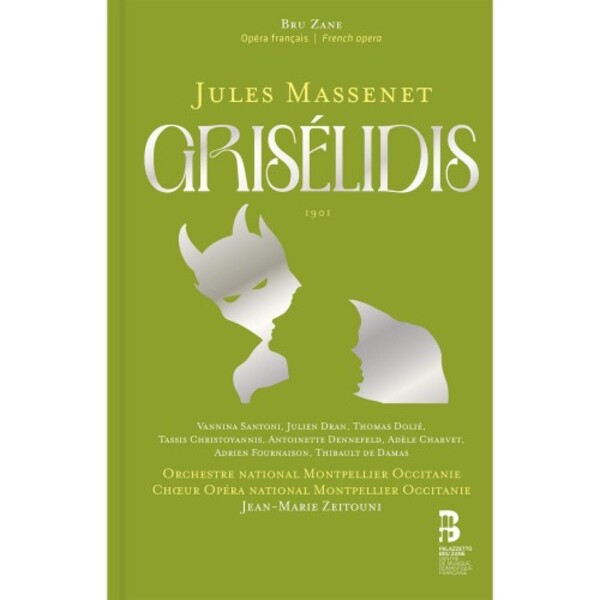MASSENET Grisélidis (Zeitouni)
View record and artist detailsRecord and Artist Details
Genre:
Opera
Label: Bru Zane
Magazine Review Date: 04/2025
Media Format: CD or Download
Media Runtime: 121
Mastering:
DDD
Catalogue Number: BZ1058

Tracks:
| Composition | Artist Credit |
|---|---|
| Grisélidis |
Jules (Emile Frédéric) Massenet, Composer
Adèle Charvet, Bertrade, Mezzo soprano Adrien Fournaison, Gondebaud, Bass Antoinette Dennefeld, Fiamina, Mezzo soprano Jean-Marie Zeitouni, Conductor Julien Dran, Alain, Tenor Montpellier Occitanie National Chorus Montpellier Occitanie National Orchestra Tassis Christoyannis, Devil, Baritone Thibault de Damas d’Anlezy, Prior, Bass-baritone Thomas Dolié, Marquis, Baritone Vannina Santoni, Grisélidis, Soprano |
Author: David Patrick Stearns
Massenet’s reputation for writing safe, middlebrow operas in the wake of Manon and Werther takes unexpected turns in this new recording of Grisélidis. Though the opera’s fitful gestation suggests why it’s among the composer’s least cohesive stage works, Grisélidis strikes out in different directions that are best appreciated in the context of the 1901 Opéra-Comique premiere. Though the story in all its variants turned up often in the Baroque era in operas by Vivaldi and Alessandro Scarlatti (titled Griselda), the title-character in this version is a less-than-fascinating wife/mother whose fidelity is tested in the absence of her husband. The culprit is a somewhat comic devil, who maintains his legendary powers to appear and disappear at will, but is also transformed by the opéra comique genre into a bourgeois husband whose wife is a sometimes domineering partner in crime.
The lower-stakes plot has Grisélidis married to a marquis rather than a king, and is motivated by the search for her kidnapped son. Amid all of this, librettists Armand Silvestre and Eugène Morand mixed comedy with the moralistic story in ways that Massenet pulled off rather engagingly, thanks to his talent for employing opera’s potential for emotional simultaneity. Such divergences from this durable archetype and manner of storytelling work in the service of creating a baritone-voice star vehicle with piquant twists. Other features: the plot allowed Massenet the juxtaposition of foreground solo voices with background choirs, both heavenly and demonic. Patter-songs and lyrical outpouring are superimposed over each other with great effect. The ballet is skilfully integrated into the plot.
In more conventional moments, one is constantly impressed by Massenet’s ability to give every plot turn the kind of music it requires. Each emotion is rendered with convincing sincerity rather than mere facility, though at the expense of long-term dramatic contour. The prologue and first act are pastoral, reflective and overall rather quiet by 19th-century opera standards, with character expositions including a lovelorn shepherd and the virtuous Grisélidis, enlivened mainly by the appearance of the devil. In lesser Handel operas, one is used to first acts that can seem like perfunctory warm-ups for higher inspiration to come. Massenet’s first act here isn’t even that. Even with the story’s distant point of reference in medieval mystery plays, this feels like a series of make-do solutions made under deadline pressure. Acts 2 and 3 are vintage Massenet. Grisélidis’s aria ‘La mer! Et sur les flots toujours bleus’ is as heartfelt as anything Massenet ever wrote but it’s attached to a character without much inner conflict. That’s the larger problem with Grisélidis. In Manon, characters are both dazzled and repulsed by their fate; in Werther, characters are equally attracted to death and life. But in Grisélidis, the characters have straightforward needs and much less dimension.
The manner of performance is unapologetic – the opera is what it is, strengths, weaknesses and all – in a set that is well done on every level, with a good sense of dramatic flow under conductor Jean-Marie Zeitouni. Across the board, the sung French and the voice-friendly recording quality are such that virtually every word is clear. Though the voluminous notes say that the original devil was probably a bit of a ham, Tassis Christoyannis conveys humour and malevolence within the bounds of classic French vocal elegance. Inevitably, Thomas Dolié as the Marquis is a less commanding presence in comparison, which is much more the fault of the music than this excellent baritone. As the shepherd Alain, Julien Dran is suitably rustic, vocally speaking, though Rolando Villazón conveys all of the emotionalism of the aria with none of the strident edges on his album of arias by Massenet and Gounod (Erato, 5/05). Vannina Santoni’s middle-weight soprano is close to ideal for the title-role, certainly keeping within the bounds of the character’s fundamentally demure temperament.
But that’s not enough for a role that makes the most sense for a singer whose very presence transcends the notes on the page in ways that make listeners care more about the character. In the recording from the 1992 Massenet Festival Saint-Étienne – hard to find but still out there – the richer, more substantial tone quality of Michèle Command is a stronger focal point for an opera that needs all the focus it can get. This recording is more about enlivening individual events of the opera than giving the long view of this, and Bru Zane, in the label’s customary style, provide irresistible packaging and documentation. Even so, I’m not giving up the older recording, and don’t anticipate doing so no matter what other Grisélidis recordings might come along in the future.
Discover the world's largest classical music catalogue with Presto Music.

Gramophone Digital Club
- Digital Edition
- Digital Archive
- Reviews Database
- Full website access
From £8.75 / month
Subscribe
Gramophone Full Club
- Print Edition
- Digital Edition
- Digital Archive
- Reviews Database
- Full website access
From £11.00 / month
Subscribe
If you are a library, university or other organisation that would be interested in an institutional subscription to Gramophone please click here for further information.




